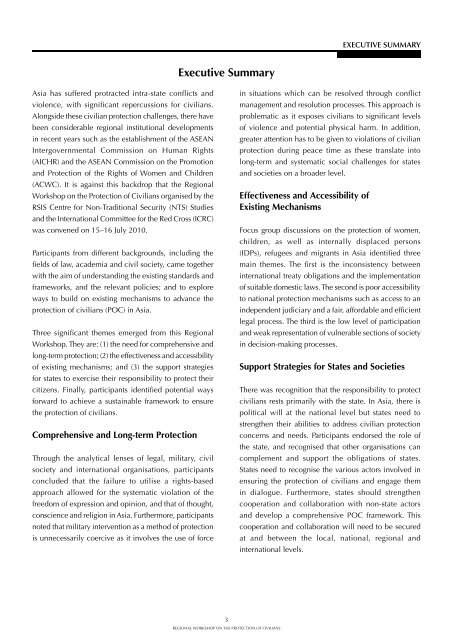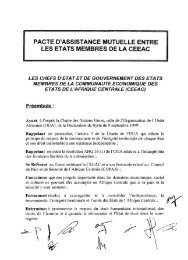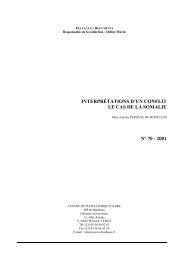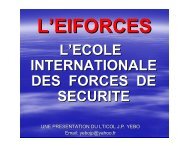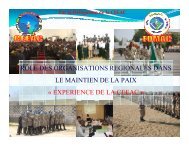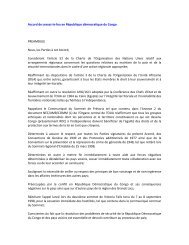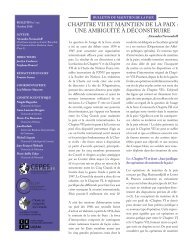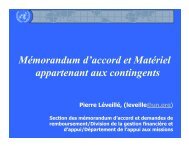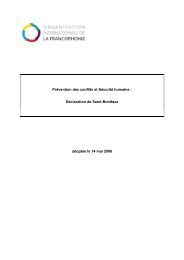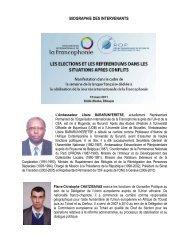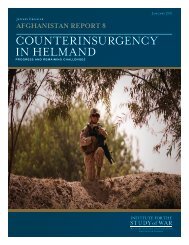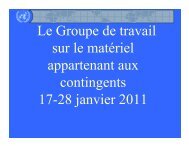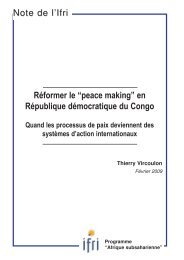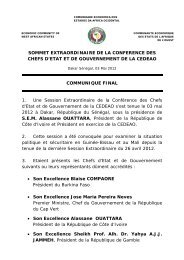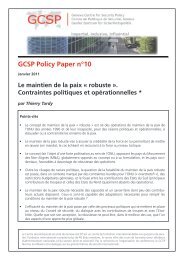Regional Workshop on the Protection of Civilians - S. Rajaratnam ...
Regional Workshop on the Protection of Civilians - S. Rajaratnam ...
Regional Workshop on the Protection of Civilians - S. Rajaratnam ...
Create successful ePaper yourself
Turn your PDF publications into a flip-book with our unique Google optimized e-Paper software.
EXECUTIVE SUMMARY<br />
Executive Summary<br />
Asia has suffered protracted intra-state c<strong>on</strong>flicts and<br />
violence, with significant repercussi<strong>on</strong>s for civilians.<br />
Al<strong>on</strong>gside <strong>the</strong>se civilian protecti<strong>on</strong> challenges, <strong>the</strong>re have<br />
been c<strong>on</strong>siderable regi<strong>on</strong>al instituti<strong>on</strong>al developments<br />
in recent years such as <strong>the</strong> establishment <strong>of</strong> <strong>the</strong> ASEAN<br />
Intergovernmental Commissi<strong>on</strong> <strong>on</strong> Human Rights<br />
(AICHR) and <strong>the</strong> ASEAN Commissi<strong>on</strong> <strong>on</strong> <strong>the</strong> Promoti<strong>on</strong><br />
and Protecti<strong>on</strong> <strong>of</strong> <strong>the</strong> Rights <strong>of</strong> Women and Children<br />
(ACWC). It is against this backdrop that <strong>the</strong> <str<strong>on</strong>g>Regi<strong>on</strong>al</str<strong>on</strong>g><br />
<str<strong>on</strong>g>Workshop</str<strong>on</strong>g> <strong>on</strong> <strong>the</strong> Protecti<strong>on</strong> <strong>of</strong> <strong>Civilians</strong> organised by <strong>the</strong><br />
RSIS Centre for N<strong>on</strong>-Traditi<strong>on</strong>al Security (NTS) Studies<br />
and <strong>the</strong> Internati<strong>on</strong>al Committee for <strong>the</strong> Red Cross (ICRC)<br />
was c<strong>on</strong>vened <strong>on</strong> 15–16 July 2010.<br />
Participants from different backgrounds, including <strong>the</strong><br />
fields <strong>of</strong> law, academia and civil society, came toge<strong>the</strong>r<br />
with <strong>the</strong> aim <strong>of</strong> understanding <strong>the</strong> existing standards and<br />
frameworks, and <strong>the</strong> relevant policies; and to explore<br />
ways to build <strong>on</strong> existing mechanisms to advance <strong>the</strong><br />
protecti<strong>on</strong> <strong>of</strong> civilians (POC) in Asia.<br />
Three significant <strong>the</strong>mes emerged from this <str<strong>on</strong>g>Regi<strong>on</strong>al</str<strong>on</strong>g><br />
<str<strong>on</strong>g>Workshop</str<strong>on</strong>g>. They are: (1) <strong>the</strong> need for comprehensive and<br />
l<strong>on</strong>g-term protecti<strong>on</strong>; (2) <strong>the</strong> effectiveness and accessibility<br />
<strong>of</strong> existing mechanisms; and (3) <strong>the</strong> support strategies<br />
for states to exercise <strong>the</strong>ir resp<strong>on</strong>sibility to protect <strong>the</strong>ir<br />
citizens. Finally, participants identified potential ways<br />
forward to achieve a sustainable framework to ensure<br />
<strong>the</strong> protecti<strong>on</strong> <strong>of</strong> civilians.<br />
Comprehensive and L<strong>on</strong>g-term Protecti<strong>on</strong><br />
Through <strong>the</strong> analytical lenses <strong>of</strong> legal, military, civil<br />
society and internati<strong>on</strong>al organisati<strong>on</strong>s, participants<br />
c<strong>on</strong>cluded that <strong>the</strong> failure to utilise a rights-based<br />
approach allowed for <strong>the</strong> systematic violati<strong>on</strong> <strong>of</strong> <strong>the</strong><br />
freedom <strong>of</strong> expressi<strong>on</strong> and opini<strong>on</strong>, and that <strong>of</strong> thought,<br />
c<strong>on</strong>science and religi<strong>on</strong> in Asia. Fur<strong>the</strong>rmore, participants<br />
noted that military interventi<strong>on</strong> as a method <strong>of</strong> protecti<strong>on</strong><br />
is unnecessarily coercive as it involves <strong>the</strong> use <strong>of</strong> force<br />
in situati<strong>on</strong>s which can be resolved through c<strong>on</strong>flict<br />
management and resoluti<strong>on</strong> processes. This approach is<br />
problematic as it exposes civilians to significant levels<br />
<strong>of</strong> violence and potential physical harm. In additi<strong>on</strong>,<br />
greater attenti<strong>on</strong> has to be given to violati<strong>on</strong>s <strong>of</strong> civilian<br />
protecti<strong>on</strong> during peace time as <strong>the</strong>se translate into<br />
l<strong>on</strong>g-term and systematic social challenges for states<br />
and societies <strong>on</strong> a broader level.<br />
Effectiveness and Accessibility <strong>of</strong><br />
Existing Mechanisms<br />
Focus group discussi<strong>on</strong>s <strong>on</strong> <strong>the</strong> protecti<strong>on</strong> <strong>of</strong> women,<br />
children, as well as internally displaced pers<strong>on</strong>s<br />
(IDPs), refugees and migrants in Asia identified three<br />
main <strong>the</strong>mes. The first is <strong>the</strong> inc<strong>on</strong>sistency between<br />
internati<strong>on</strong>al treaty obligati<strong>on</strong>s and <strong>the</strong> implementati<strong>on</strong><br />
<strong>of</strong> suitable domestic laws. The sec<strong>on</strong>d is poor accessibility<br />
to nati<strong>on</strong>al protecti<strong>on</strong> mechanisms such as access to an<br />
independent judiciary and a fair, affordable and efficient<br />
legal process. The third is <strong>the</strong> low level <strong>of</strong> participati<strong>on</strong><br />
and weak representati<strong>on</strong> <strong>of</strong> vulnerable secti<strong>on</strong>s <strong>of</strong> society<br />
in decisi<strong>on</strong>-making processes.<br />
Support Strategies for States and Societies<br />
There was recogniti<strong>on</strong> that <strong>the</strong> resp<strong>on</strong>sibility to protect<br />
civilians rests primarily with <strong>the</strong> state. In Asia, <strong>the</strong>re is<br />
political will at <strong>the</strong> nati<strong>on</strong>al level but states need to<br />
streng<strong>the</strong>n <strong>the</strong>ir abilities to address civilian protecti<strong>on</strong><br />
c<strong>on</strong>cerns and needs. Participants endorsed <strong>the</strong> role <strong>of</strong><br />
<strong>the</strong> state, and recognised that o<strong>the</strong>r organisati<strong>on</strong>s can<br />
complement and support <strong>the</strong> obligati<strong>on</strong>s <strong>of</strong> states.<br />
States need to recognise <strong>the</strong> various actors involved in<br />
ensuring <strong>the</strong> protecti<strong>on</strong> <strong>of</strong> civilians and engage <strong>the</strong>m<br />
in dialogue. Fur<strong>the</strong>rmore, states should streng<strong>the</strong>n<br />
cooperati<strong>on</strong> and collaborati<strong>on</strong> with n<strong>on</strong>-state actors<br />
and develop a comprehensive POC framework. This<br />
cooperati<strong>on</strong> and collaborati<strong>on</strong> will need to be secured<br />
at and between <strong>the</strong> local, nati<strong>on</strong>al, regi<strong>on</strong>al and<br />
internati<strong>on</strong>al levels.<br />
3<br />
REGIONAL WORKSHOP ON THE PROTECTION OF CIVILIANS


